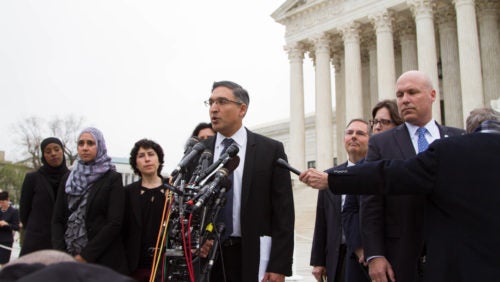Georgetown Law Professor Neal Katyal, Counsel in Trump v. Hawaii, Issues Statement after SCOTUS Decision
June 26, 2018

In this file photo from April, Georgetown Law Professor Neal Katyal faces the press on the steps of the Supreme Court after oral arguments in Trump v. Hawaii. The Court decided the case June 26.
This spring, the Supreme Court heard oral argument in the case of Trump v. Hawaii — with Georgetown Law Professor Neal Katyal, co-head of the appellate practice at Hogan Lovells, arguing as counsel of record for the State of Hawaii. Katyal’s brief asserted that the most recent version of President Trump’s travel ban — which placed entry restrictions on the nationals of eight foreign states — exceeded the president’s authority under the nation’s immigration laws as well as the Establishment Clause of the U.S. Constitution.
But on June 26, the Supreme Court held in a 5-4 decision that the president lawfully executed the broad discretion granted to him under the Immigration and Nationality Act to suspend the entry of aliens into the United States; and that the plaintiffs have not demonstrated a likelihood of success on the merits of the claim that the travel ban violated the Establishment Clause.
“By its terms, §1182(f) exudes deference to the President in every clause…” Chief Justice John Roberts wrote for the Court on the immigration issue. “The Proclamation falls well within this comprehensive delegation.”
Regarding the Establishment Clause, the plaintiffs had alleged that the primary purpose of Proclamation No. 9645 was religious animus and discrimination against Muslims. “At the heart of plaintiffs’ case is a series of statements by the President and his advisers casting doubt on the official objective of the Proclamation,” the Court noted. “But the issue before us is not whether to denounce the statements. It is instead the significance of those statements in reviewing a Presidential directive, neutral on its face, addressing a matter within the core of executive responsibility. In doing so, the Court must consider not only the statements of a particular President, but also the authority of the Presidency itself.”
Considering whether the proclamation “is plausibly related to the government’s stated objective to protect the country and improve vetting processes,” the majority concluded that “the Government has set forth a sufficient national security justification to survive rational basis review. We express no view on the soundness of the policy. We simply hold today that plaintiffs have not demonstrated a likelihood of success on their constitutional claim.”
“System work[s] as the founders intended”
In a public statement after the decision, Katyal said: “In this case, it was not the decision but the process that defines America and that gives me hope.”
“Though I am disappointed in the outcome, I am heartened that our system of government worked as the founders have intended. Over the past year, a suit brought by ordinary Americans has made its way through the federal courts, and at every step the judiciary forced the White House to amend their travel bans to bring them more in line with our Constitution. While we continue to believe that this third version fails that test, there is no question that by striking down the first two travel bans, the judiciary forced a recalcitrant administration to at least give its order the veil of constitutionality.”
“We continue to believe, as do four dissenting justices, that the travel ban is unconstitutional, unprecedented, unnecessary and un-American. We decided long ago that America doesn’t exclude people based on nationality or religion alone. Today, that principle has been challenged…. As the Supreme Court has repeatedly said, not everything that is constitutional is good policy. The travel ban is atrocious policy, and makes us less safe and undermines our American ideals. Now that the Court has upheld it, it is up to Congress to do its job and reverse [the] travel ban.”
“I am proud to have played a part in this case…I look forward to continuing to advocate on behalf of the rule of law[,]” Katyal’s June 26 statement concludes.
Katyal, who served as acting solicitor general in 2010-2011 and is now faculty director of Georgetown Law’s Institute for Constitutional Advocacy and Protection, said to Georgetown Law after the decision that he was particularly grateful to the faculty colleagues and students “who gave me so many ideas and encouragement over the many months litigating this case.” At the time of oral arguments in April, Katyal noted that the faculty and the school’s Supreme Court Institute were essential in helping him think about the case. “Georgetown is truly the best place to learn about and to influence the law,” he said.